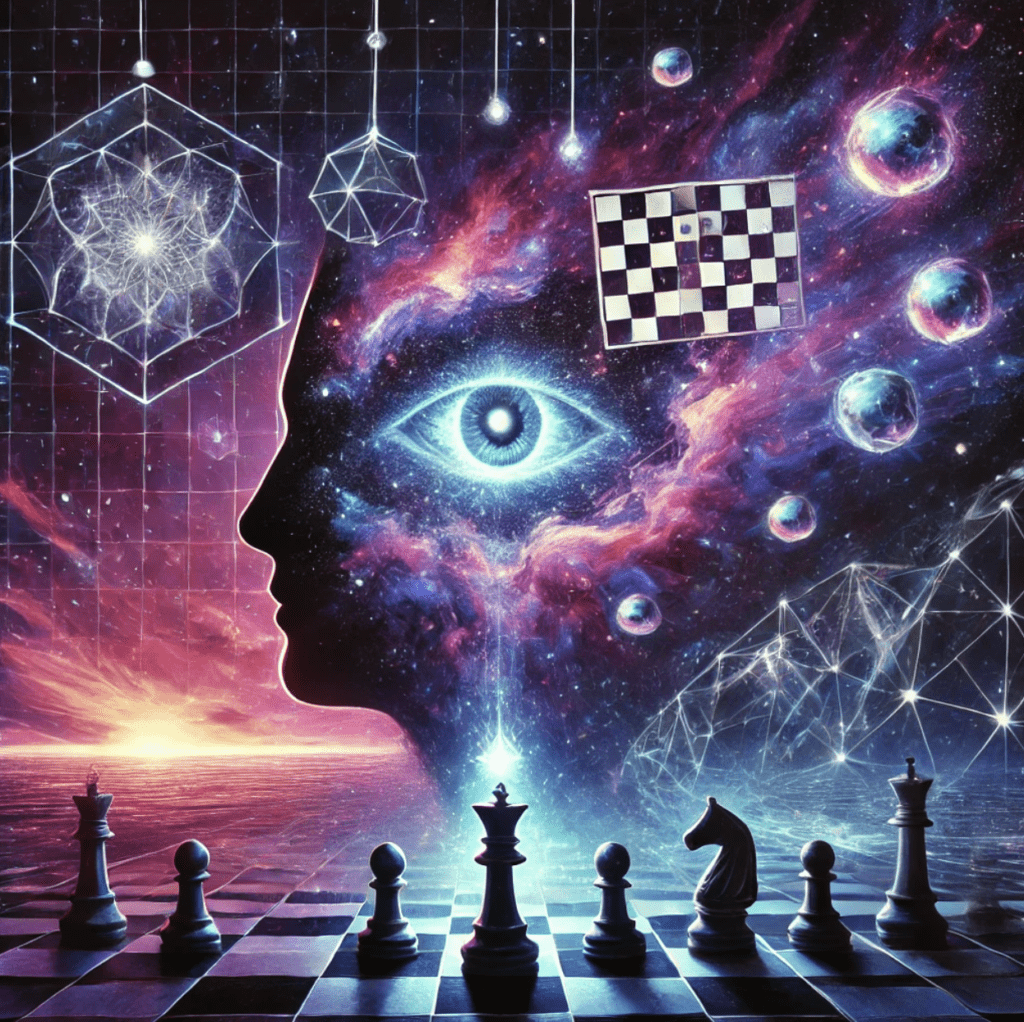The world we perceive is, in many ways, a complex mind game.
Our understanding of reality is deeply intertwined with the workings of our mind, making the external world inseparable from our internal experiences.
This intricate relationship between:
- Perception
- Consciousness
- And reality
has been a subject of contemplation for philosophers, scientists, and mystics for centuries.
By exploring how our minds shape our experience of the world, we can uncover profound insights into the nature of reality itself.
Table of Contents
TogglePerception: The Constructed Reality
Our perception of the world is not a direct representation of external reality but a constructed experience mediated by our senses and cognitive processes.
The brain receives a continuous stream of sensory info, which it then interprets and organizes to create a coherent picture of the world.
This process is far from passive – it involves:
For instance, consider the phenomenon of optical illusions.
These visual tricks demonstrate how our brains can be deceived by certain patterns of light and shadow, leading us to perceive things that are not there.
Optical illusions highlight the fact that what we see is not always an accurate reflection of the external world but rather a mental construction influenced by:
- Context
- Expectations
- And prior knowledge.
The Role of Consciousness
Consciousness plays a central role in shaping our experience of reality.
It is the lens through which we interpret and interact with the world.
The nature of consciousness itself is a profound mystery, and understanding it is key to unraveling the mind game of reality.
One prominent theory in neuroscience is the “Integrated Information Theory” (IIT), which suggests that consciousness arises from the integration of information within a system.
According to IIT, the more interconnected and integrated a network of neurons, the richer the conscious experience it can generate.
This implies that our conscious experience is a dynamic and ever-evolving process, shaped by the intricate workings of our neural networks.
The concept of “neuroplasticity” further underscores the malleability of our conscious experience.
Neuroplasticity refers to the brain’s ability to reorganize itself by forming new neural connections throughout life.
This adaptability means that our perception of reality can change based on:
- New experiences
- Learning
- And even deliberate mental training, such as mindfulness and meditation.
The Philosophical Perspective
Philosophers have long debated the nature of reality and the mind’s role in constructing it.
The ancient Greek philosopher Plato famously proposed the Allegory of the Cave, in which prisoners chained inside a cave perceive shadows on the wall as their only reality.
According to Plato, these shadows represent the distorted perceptions of those who are unaware of the true nature of reality.
The journey out of the cave symbolizes the philosophical quest for knowledge and enlightenment, revealing the deeper truths hidden behind our sensory experiences.
In the realm of Eastern philosophy, particularly in Hinduism and Buddhism, the concept of “Maya” describes the illusory nature of the world.
Maya suggests that the reality we perceive is a veil that obscures the underlying unity of existence.
The practice of meditation and mindfulness is seen as a means to pierce this veil and attain a direct experience of reality unmediated by the mind’s constructs.
The Impact of Belief Systems
Our beliefs and cognitive frameworks significantly influence our perception of reality.
Cognitive psychologists refer to these frameworks as “schemas,” mental structures that organize our knowledge and expectations.
Schemas help us navigate the world efficiently but can also lead to biases and distortions in our perception.
One powerful example of this is the placebo effect, where a person’s belief in the efficacy of a treatment can lead to real physiological and psychological improvements, even if the treatment itself is inert.
The placebo effect demonstrates how our beliefs and expectations can shape our bodily experiences and perceptions of reality.
Similarly, cultural and societal beliefs play a crucial role in shaping our worldview.
Different cultures have distinct ways of interpreting the world, which can lead to vastly different experiences and understandings of reality.
This cultural lens influences everything from our perception of time and space to our concepts of morality and self-identity.
The Simulation Hypothesis
In recent years, the idea that the world might be a simulated reality, akin to a sophisticated mind game, has gained traction among scientists and philosophers.
The Simulation Hypothesis, posits that advanced civilizations could create highly detailed simulations of reality, and it is possible that we are living in one such simulation.
Proponents of the Simulation Hypothesis argue that if it is technologically feasible to create simulations indistinguishable from reality, and if such simulations are likely to be created, then it is statistically probable that our reality is a simulation.
This perspective challenges our conventional understanding of reality and raises profound questions about the nature of existence and the limits of human knowledge.
Conclusion: Embracing the Mind Game
Understanding the world as a mind game invites us to reconsider the nature of reality and our place within it.
By recognizing the role of:
- Perception
- Consciousness
- And belief systems
in shaping our experience, we can cultivate a more nuanced and flexible understanding of reality.
This perspective encourages us to:
- Question our assumptions
- Embrace uncertainty
- And remain open to new ways of seeing and experiencing the world.
In the end, the mind game of reality is not a deception but a testament to the incredible complexity and richness of human consciousness.
It is an invitation to explore the depths of our minds and the boundless possibilities of existence.
Whether through:
- Philosophical inquiry
- Scientific exploration
- Or meditative practice
the journey into the mind game of reality offers endless opportunities for discovery and transformation.
Want access to more powerful insights?
Read “Timeline Meditations“.
It’s a collection of golden maxims designed to help you grow.
Enjoy.
-M.I.
You May Also Like:
How To Improve Your Information Diet
How To Improve Presence Of Mind (And Become Unbreakable)
Living Outside The Box: The Power of Creation Over Reaction
The Hidden Truth About Belief: Why Thinking Alone Will Never Change Your Life
A Guide to Smarter Decision-Making: Understanding and Applying Positive Expected Value (EV+) Moves
How to Spot Asymmetric Opportunities That 99% Ignore
What Rich People Won’t Tell You: The Invisible Forces That Control Wealth and How to Harness Them
Mastering Multi-Order Consequences: The Key to Strategic Thinking
My name is Mister Infinite. I've written 600+ articles for people who want more out of life. Within this website you will find the motivation and action steps to live a better lifestyle.
- Mister Infinitehttps://misterinfinite.com/author/misterinfinite/
- Mister Infinitehttps://misterinfinite.com/author/misterinfinite/
- Mister Infinitehttps://misterinfinite.com/author/misterinfinite/
- Mister Infinitehttps://misterinfinite.com/author/misterinfinite/


